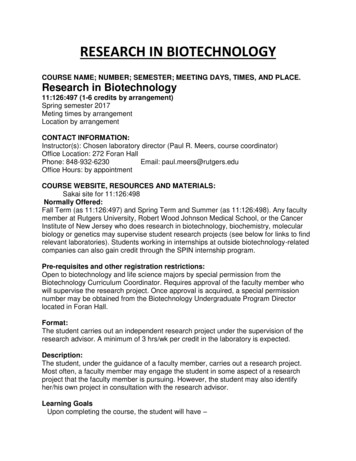
Transcription
RESEARCH IN BIOTECHNOLOGYCOURSE NAME; NUMBER; SEMESTER; MEETING DAYS, TIMES, AND PLACE.Research in Biotechnology11:126:497 (1-6 credits by arrangement)Spring semester 2017Meting times by arrangementLocation by arrangementCONTACT INFORMATION:Instructor(s): Chosen laboratory director (Paul R. Meers, course coordinator)Office Location: 272 Foran HallPhone: 848-932-6230Email: paul.meers@rutgers.eduOffice Hours: by appointmentCOURSE WEBSITE, RESOURCES AND MATERIALS:Sakai site for 11:126:498Normally Offered:Fall Term (as 11:126:497) and Spring Term and Summer (as 11:126:498). Any facultymember at Rutgers University, Robert Wood Johnson Medical School, or the CancerInstitute of New Jersey who does research in biotechnology, biochemistry, molecularbiology or genetics may supervise student research projects (see below for links to findrelevant laboratories). Students working in internships at outside biotechnology-relatedcompanies can also gain credit through the SPIN internship program.Pre-requisites and other registration restrictions:Open to biotechnology and life science majors by special permission from theBiotechnology Curriculum Coordinator. Requires approval of the faculty member whowill supervise the research project. Once approval is acquired, a special permissionnumber may be obtained from the Biotechnology Undergraduate Program Directorlocated in Foran Hall.Format:The student carries out an independent research project under the supervision of theresearch advisor. A minimum of 3 hrs/wk per credit in the laboratory is expected.Description:The student, under the guidance of a faculty member, carries out a research project.Most often, a faculty member may engage the student in some aspect of a researchproject that the faculty member is pursuing. However, the student may also identifyher/his own project in consultation with the research advisor.Learning GoalsUpon completing the course, the student will have –
1. Gained background knowledge of the field of the project and the specificproblem(s) to be addressed using the public literature and coursework, andappropriately summarized it.2. Appropriately stated the hypothesis or hypotheses to be tested and explained theexperiments devised to test it.3. Gained proficiency in the laboratory techniques and scientific approaches used inbiotechnology to address the specific hypothesis (es) at hand.4. Appropriately documented (e.g. notebook) and analyzed data.5. Learned to interpret data and draw appropriate conclusions and define futurepossible directions of the work.Assessment Rubric:RubricsRanking Scale123Unsatisfactory Satisfactory Good4OutstandingLearning Goal 1. Knowledge of the field– factual and conceptualLearning Goal 2. Statement andjustification of hypothesisLearning Goal 3: Laboratory techniquesproficiencyLearning Goal 4 Analysis, presentationand interpretation of data.Learning Goal 5. Drawing appropriateconclusions and identifying implicationsand interpreted.ExaminationsNoneOther requirements:All students are expected to write a paper describing the research project at the end ofthe semester in journal article format. Copies are submitted to the research advisor andthe Biotechnology Undergraduate Program Director. A Sakai site dropbox for submittedreports is established each semester for student submissions.GradingThe research advisor is responsible for grading the student and reporting the grade tothe Curriculum Coordinator/Program Director. The grade reflects overall performance inthe laboratory, including the final report.Additional Information:To find a lab:Look at two sources:1) the list of biotech faculty mentors on the biotech curriculum website
tbd (see list below) (for faculty on this campus) and2) http://lifesci.rutgers.edu/ molbiosci/faculty (for faculty who do researchin "biotech" at Rutgers and UMDNJ and affiliated hospitals.Then make a short list ( 10) of faculty that most interest you. After doing a little moresearching on the web about the research conducted in each of these faculty labs,carefully compose a brief email that 1) tells the prospective mentor about yourself(major,year, college, interests, etc.); 2) states why the you are interested in the researchof the faculty mentor; and 3) asking for an appointment to meet the faculty member totalk about the research and possibly working in that faculty member's lab in the coming(semester).To get credit, enroll in Research in Biotechnology 11:126:497 when you have enoughtime in your schedule to do three credits (minimum of nine hr/wk in the lab for the entiresemester). If you have less time, you should volunteer (or get their feet wet by workingwith a grad student) until they can enroll for three credits. The program coordinatorgives special permission numbers for Research in Biotech after the student has amentor.In terms of paid internships, you should visit the SPIN Office in Martin Hall. They shouldalso visit the Career Services Office with help to prepare a resume.If you desire additional information, speak with the Biotechnology UndergraduateProgram Director.FURTHER INFORMATIONThe exciting new world of Biotechnology in the 21st century has developedas a result of the convergence of biological, physical and mathematicalsciences to solve problems in ways never before imagined. Thebreathtaking advance of DNA sequencing is one example of the power ofthis approach. In Biotechnology, students are trained in a broad range ofbasic sciences as a foundation for many important real-world applications.
A major part of this training is participation in research. All Biotechnologymajors participate in at least 3 credit hours of research. Students have alarge number of research laboratories across all the Rutgers campusesfrom which to choose research projects when positions are available (seeSEBS list below or link for non-SEBS labs http://lifesci.rutgers.edu/ molbiosci/faculty)Students gain a truly complete understanding of what they have learned intheir courses when that knowledge is applied in research. Why is itimportant to know how to calculate molarities? Why is the relative solubilityof hydrophilic and hydrophobic molecules important? Why do I need toknow about pKa? Why is it important to know how to keep samples sterile?You will learn in research. You may make exciting new discoveries, butmore importantly you will learn to plan an efficient day of research and howto accurately document and interpret your results. Understanding “howresearch works” is a very important skill whether you become an academicprincipal investigator or a business development executive of abiotechnology company. Planning and assessing feasibility comes fromyour direct experience in doing research.
Aside from the Research in Biotechnology course (see below), studentscan also perform research projects in the SEBS Honors program andGeorge H. Cook Scholars program (links below) at the School ofEnvironmental and Biological Sciences.(http://sebshonors.rutgers.edu/general honors program/)(http://sebshonors.rutgers.edu/gh cook scholars program/)In addition, students can do Biotechnology research in the university-wideAresty program (https://aresty.rutgers.edu/). An internship or paid work inBiotechnology at a company outside Rutgers can also qualify for researchcredit through the Rutgers SPIN program (http://sebsspin.rutgers.edu/).Biotechnology students have distinguished themselves in each of theseprograms. For instance, in the most recent Aresty Undergraduate ResearchSymposium, Biotechnology students received a Best Poster Award (DanielHollerbach) and two Honorable Mentions (Katie Fullerton and ConnorLamontagne). Some students have even presented research at nationalmeetings of large professional scientific societies (e.g. Biophysical Society).
POLICIES AND RESOURCES:ACCOMODATIONS FOR STUDENTS WITH DISABILITIESPlease follow the procedures outlined at https://ods.rutgers.edu/students/registrationform. Full policies and procedures are at https://ods.rutgers.edu/ABSENCE POLICYStudents are expected to attend all classes; if you expect to miss one or two classes, pleaseuse the University absence reporting website https://sims.rutgers.edu/ssra/ to indicatethe date and reason for your absence. An email is automatically sent to me.ACADEMIC INTEGRITYThe university's policy on Academic Integrity is available tegrity-policy. The principles of academicintegrity require that a student: properly acknowledge and cite all use of the ideas, results, or words of others. properly acknowledge all contributors to a given piece of work. make sure that all work submitted as his or her own in a course or other academic activityis produced without the aid of impermissible materials or impermissible collaboration. obtain all data or results by ethical means and report them accurately without suppressingany results inconsistent with his or her interpretation or conclusions. treat all other students in an ethical manner, respecting their integrity and right to pursuetheir educational goals without interference. This requires that a student neither facilitateacademic dishonesty by others nor obstruct their academic progress. uphold the canons of the ethical or professional code of the profession for which he orshe is preparing.Adherence to these principles is necessary in order to ensure that everyone is given proper credit for his or her ideas, words, results, and other scholarlyaccomplishments. all student work is fairly evaluated and no student has an inappropriate advantage overothers. the academic and ethical development of all students is fostered. the reputation of the University for integrity in its teaching, research, and scholarship ismaintained and enhanced.Failure to uphold these principles of academic integrity threatens both the reputation of theUniversity and the value of the degrees awarded to its students. Every member of the Universitycommunity therefore bears a responsibility for ensuring that the highest standards of academicintegrity are upheld.STUDENT WELLNESS SERVICESJust In Case Web App http://codu.co/cee05eAccess helpful mental health information and resources for yourself or a friend in amental health crisis on your smartphone or tablet and easily contact CAPS or RUPD.
Counseling, ADAP & Psychiatric Services (CAPS)(848) 932-7884 / 17 Senior Street, New Brunswick, NJ 08901/www.rhscaps.rutgers.edu/CAPS is a University mental health support service that includes counseling, alcoholand other drug assistance, and psychiatric services staffed by a team of professionalwithin Rutgers Health services to support students’ efforts to succeed at RutgersUniversity. CAPS offers a variety of services that include: individual therapy, grouptherapy and workshops, crisis intervention, referral to specialists in the community andconsultation and collaboration with campus partners.Violence Prevention & Victim Assistance (VPVA)(848) 932-1181 / 3 Bartlett Street, New Brunswick, NJ 08901 / www.vpva.rutgers.edu/The Office for Violence Prevention and Victim Assistance provides confidential crisisintervention, counseling and advocacy for victims of sexual and relationship violenceand stalking to students, staff and faculty. To reach staff during office hours when theuniversity is open or to reach an advocate after hours, call 848-932-1181.Disability Services(848) 445-6800 / Lucy Stone Hall, Suite A145, Livingston Campus, 54 Joyce KilmerAvenue, Piscataway, NJ 08854 / https://ods.rutgers.edu/Rutgers University welcomes students with disabilities into all of the University'seducational programs. In order to receive consideration for reasonableaccommodations, a student with a disability must contact the appropriate disabilityservices office at the campus where you are officially enrolled, participate in an intakeinterview, and provide documentation: elines. If the documentation supports your request for reasonable accommodations,your campus’s disability services office will provide you with a Letter ofAccommodations. Please share this letter with your instructors and discuss theaccommodations with them as early in your courses as possible. To begin this process,please complete the Registration form on the ODS web site orm.Scarlet Listeners(732) 247-5555 / http://www.scarletlisteners.com/Free and confidential peer counseling and referral hotline, providing a comforting andsupportive safe space.
Pre-requisites and other registration restrictions: Open to biotechnology and life science majors by special permission from the Biotechnology Curriculum Coordinator.

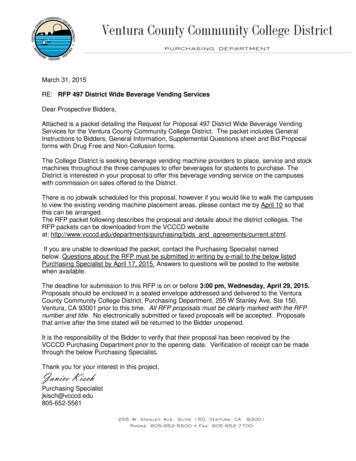
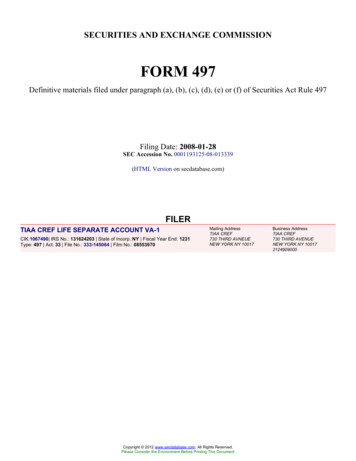
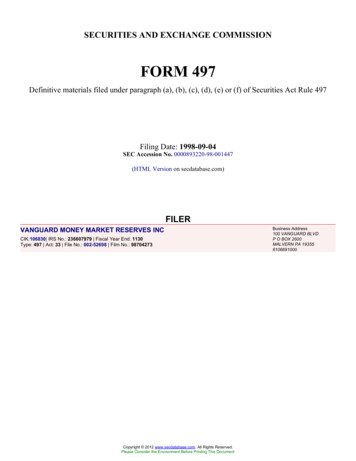


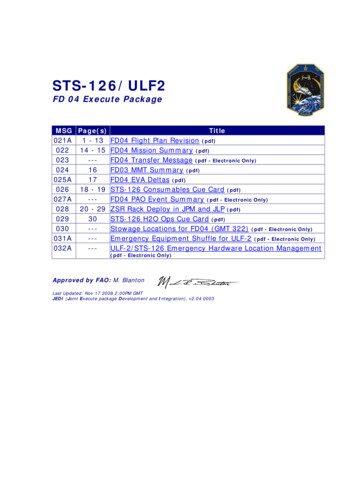

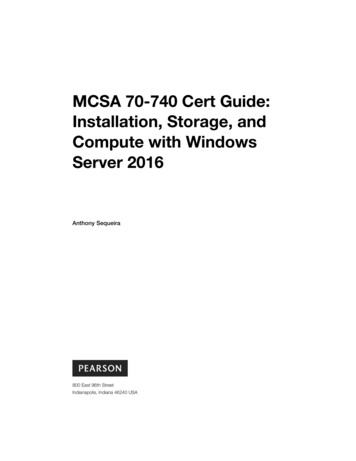

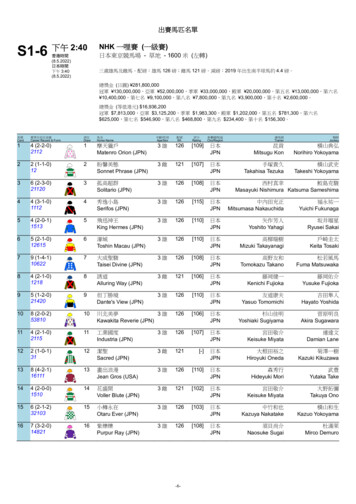
![First Revision No. 3-NFPA 497-2014 [ Chapter 2 ]](/img/5/497-a2016-eec-aaa-fd-frstatments.jpg)